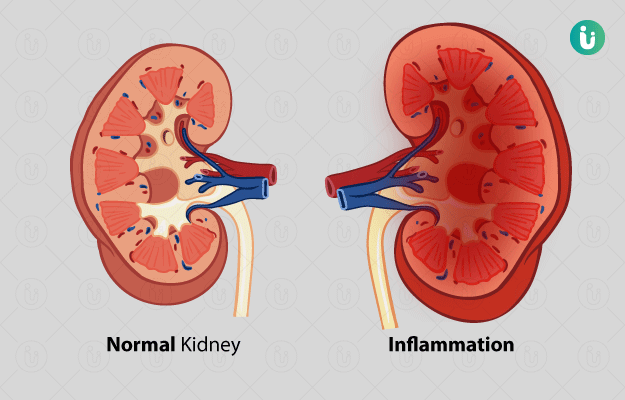What is nephritis?
Nephritis is a condition in which one or both kidneys are swollen and inflamed. Kidneys are a vital organ in the human body as they help in clearing out excess water along with other waste products and retain necessary materials like protein in the body. Damage to the kidneys causes our body to lose essential nutrients like proteins through the urine. Nephritis is of two types:
- Glomerulonephritis, in which the glomeruli are inflamed, affecting the filtering of waste and water from the body.
- Interstitial nephritis, in which the interstitium, i.e., the spaces between the tubules in the kidneys are inflamed, affecting kidney function.
What are its main signs and symptoms?
The symptoms of nephritis are:
- Fever and a general feeling of illness
- Swelling and inflammation in the body
- Weight gain due to water retention
- Blood in the urine, vomit or stools
- Changes in urine output
- Rash
- Nausea and vomiting
- Diarrhoea
What are its main causes?
Although the exact causes of nephritis are not clear, they may vary depending upon the type of nephritis.
Glomerulonephritis may be caused by:
- A dysfunction in the immune system
- History of cancer
- Exposure to hydrocarbon solvents
- Disorders of the blood or lymphatic system
- Viral infections, heart infection, and abscess
- Lupus nephritis
- Disorders affecting the basal layer of glomeruli, which play a role in filtration
- Kidney diseases due to excessive use of painkillers
Interstitial nephritis may be caused by:
- Side effects of drugs
- Excess uric acid and calcium in the blood
- Infections
- Potassium deficiency in the blood
- Autoimmune disorder
- Allergic reactions
How is it diagnosed and treated?
Glomerulonephritis can be diagnosed with the help of:
- Abdominal CT scanning
- Chest X-rays
- Ultrasound imaging of the kidneys
- Intravenous pyelogram
- Urine test to detect creatinine clearance, protein, red blood cells, uric acid, etc.
Interstitial nephritis can be diagnosed with the help of:
- BUN and creatinine levels in the blood
- Complete blood count
- Ultrasound imaging of the kidneys
- Urine test
- Kidney biopsy
Treatment of both types of nephritis depends on the cause of the condition. Controlling the causes can help in the management of the condition. Some measures that help in the management of nephritis are:
- Limiting salt intake to manage blood pressure
- Limiting protein intake to control waste production
- Anti-inflammatory medications
- Anti-hypertensive medications (Read more: High blood pressure treatment)
- Kidney transplantation or dialysis may be needed in case of kidney

 Doctors for Nephritis
Doctors for Nephritis  OTC Medicines for Nephritis
OTC Medicines for Nephritis


















